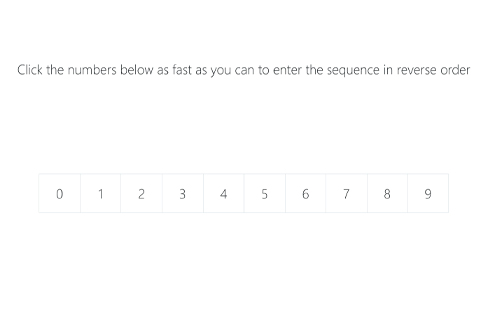

#BAKWARD DIGIT SPAN TEST PDF SERIES#
The test consists of two parts: repeating digit sequences in the order presented (forward digit span or FDS) and then a second series of digits backward in reverse order (backward digit span or BDS).Ĭonventionally, the total number of correctly recalled digit spans from both FDS and BDS comprises the final score of the test. In administering the DS task, an examiner aurally presents sequences of digits with increasing length ( e.g., “2 5 6 8”, etc.) to subjects who are then asked to recite the digits in the same exact order. Here, “short-term memory” accounts for a person’s ability to recall a few presented digits, in a given short period of time. It has been incorporated in several commonly used dementia screening batteries, such as the Montreal Cognitive Assessment, the Saint Louis Mental Status Examination and the Neurobehavioral Cognitive Status Examination. In addition, in order to facilitate research development and potentially wider use and adoption, we required tests to be developed in this way should be in the public domain.Īs a proof of concept of this approach, we evaluated the Digit Span (DS) task, a verbal attention and working memory task that has been widely used in the cognitive assessment of both children and adults for over a century. This would create a “cross-walk” back to the conventional testing experience and establish the sensitivity of digital measures. In this context, we incorporated several approaches to overcome these barriers, based on the principle that one ideally could use audio recorded legacy tests administered to patients that would provide conventional summary scores, while at the same time use the digital audio files captured during these testing sessions to analyze automated speech and language characteristics beyond the conventional scoring. This may, in part be related to the relatively small evidence base of this assessment paradigm, the often proprietary nature of computerized cognitive tests, the comfort of continuing to use tests that have been employed for decades and are widely familiar, and the slow adoption of digital behavioral biomarkers in general. This approach provides greater quality control of the testing itself, as well as the ability to quantitate not only traditional metrics such as total number of correct responses, but meta-data regarding, for example, the timing of responses, the character of the speech and language contained within each response, and automated analysis across multiple responses.ĭespite the promise of these approaches, there is not yet a deep experience with or wide adoption of automated cognitive test analysis approaches. Among these are innovations in the administration and evaluation of the responses that are afforded by the digital recording of spoken language responses to cognitive tests coupled with automated speech and language analysis of the captured audio files. Recent years have seen several advances to improve the shortcomings of current conventional cognitive assessments for MCI and dementia. In general, these assessments have a number of constraints including requiring a trained clinician, only occurring at a time and location convenient to both the patient and the assessor, and being relatively “noisy” in terms of high intra- and inter- individual variability.
#BAKWARD DIGIT SPAN TEST PDF FULL#
Full assessment may take from 90 minutes to several hours. Typically, cognitive assessment has been conducted during a clinical visit either in a screening mode by a clinician using a familiar brief test battery, or for a more expansive assay of the patient’s cognitive landscape by a trained psychometrician or neuropsychologist who administers a battery of standardized tests that survey multiple domains of cognitive function.

These range from screening for MCI for case identification in clinical trials, to substantiating progressive cognitive decline for diagnostic purposes. There are a number of specific settings where this cognitive assessment is a priority. The assessment of cognitive change is fundamental in determining whether an individual may be developing mild cognitive impairment (MCI), the clinical transition state often precedent to dementia.


 0 kommentar(er)
0 kommentar(er)
